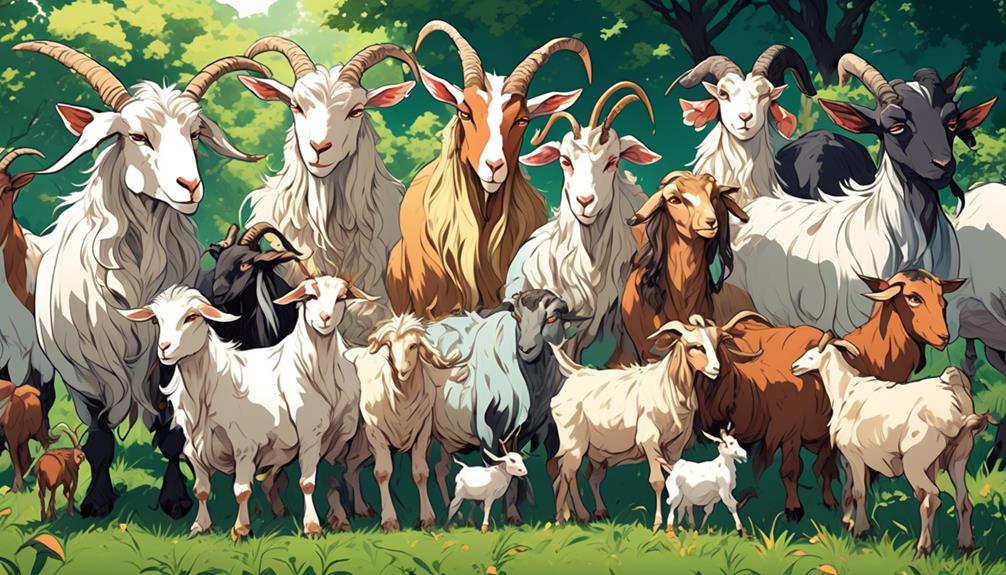As you step into the world of goat ownership, you find yourself standing at a crossroads, faced with a myriad of choices. It’s like standing in front of a vast field of flowers, each one unique in its beauty and purpose.
How do you navigate through this sea of options and choose the right goat breed for your homestead or farm? Well, my friend, let’s take a stroll together and uncover the factors that will guide you towards the perfect breed that aligns with your goals, resources, and aspirations.
Goat Selection Basics…
- Determine your goals and purpose for keeping goats, as this will help you choose the right breed that aligns with your needs and aspirations.
- Consider factors such as size preference, available land or feed, and climate adaptability when selecting a goat breed.
- Different breeds excel in different areas, such as meat production, dual-purpose capabilities, dairy production, or brush clearing. Choose a breed that suits your specific requirements.
- Using goats for brush clearing not only efficiently clears land but also provides a sustainable and eco-friendly alternative to chemical herbicides, improving pasture quality and creating usable land for various purposes.
Factors to Consider
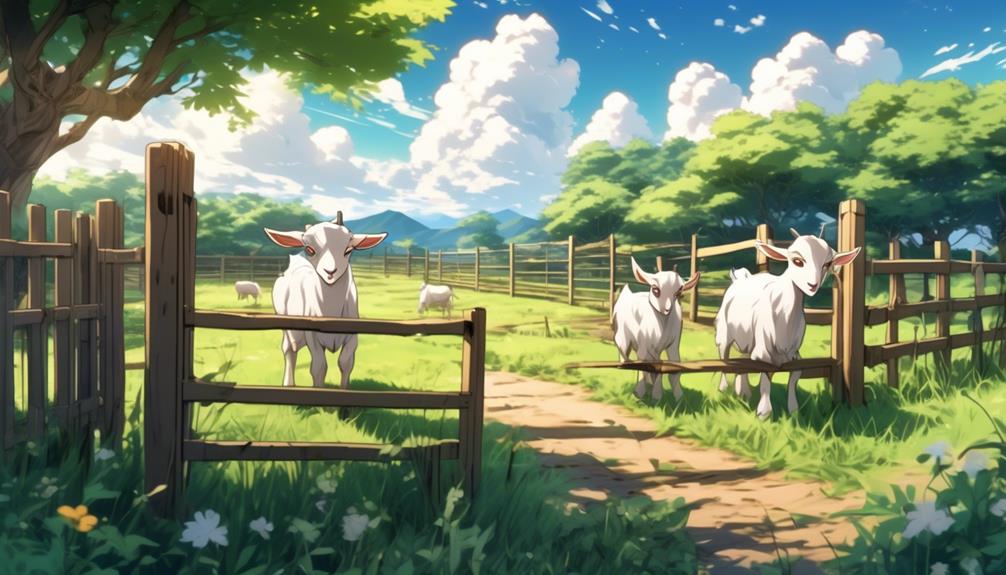
When considering the right goat breed for your homestead or farm, there are several factors to take into account.
First, determine your goal and purpose for keeping goats.
Are you looking for a dairy breed that will provide you with fresh milk every day? Or perhaps you’re interested in a meat breed for sustainable meat production. Knowing your purpose will help you choose the best breed for your needs.
Next, consider the size preference and available land or feed.
If you have limited space, a small goat breed like the Nigerian Dwarf might be a good fit. They’re known for their high milk production despite their small stature. On the other hand, if you have ample space and resources, a larger breed like the Saanen or Alpine may be more suitable.
Goat temperament is another important factor to consider.
Some breeds are known to be more docile and friendly, while others may be more independent and less inclined to interact with humans. Assess the temperament of the breed and ensure it aligns with your desired level of interaction.
Lastly, evaluate the climate adaptability and weather conditions in your area. Some goat breeds are better suited for hot climates, while others thrive in colder environments. Consider the climate in your region and choose a breed that can tolerate it.
Best Meat Goat Breeds
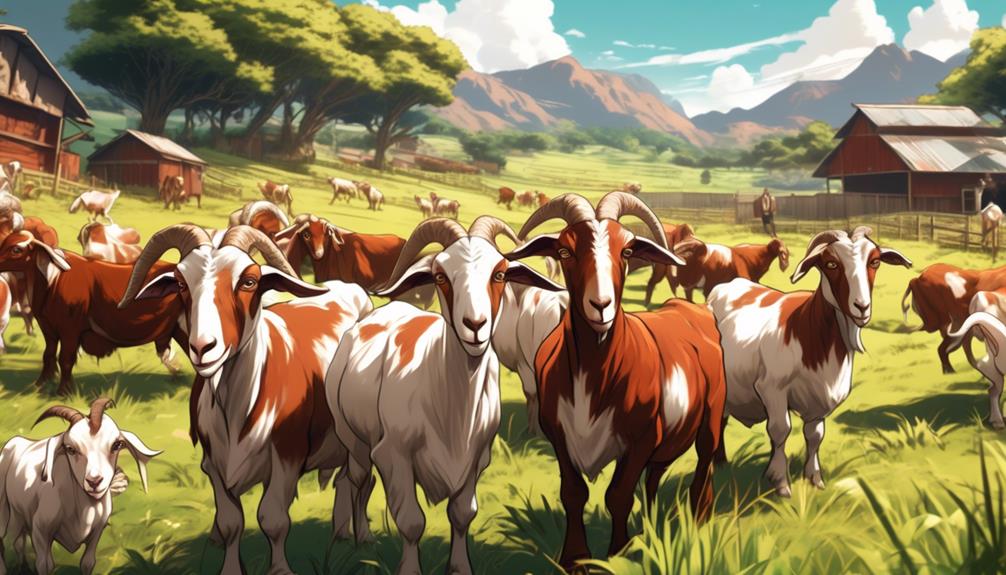
Lets start with the best meat goat breeds for your homestead or farm.
When choosing the right goat breed for meat production, there are several options to consider. Here are three popular meat goat breeds to help you make an informed decision:
- Boer Goats: Boer goats are known for their excellent meat yield and quality. They’ve a high meat-to-bone ratio, which means you get more meat per pound. Boer goats also have a delicious flavor, making them a favorite among meat lovers. These goats are fast growers and have good muscle production, making them an ideal choice for meat production on your farm.
- Kiko Goats: Kiko goats are another excellent choice for meat production. They’re hardy and adaptable, making them suitable for various climates. Kiko goats have good meat yield and quality, and they’re known for their fast growth. If you’re looking for a low-maintenance meat goat breed, Kikos are a great option.
- Spanish Goats: Spanish goats are known for their ability to thrive in harsh environments. They’ve good meat yield and quality, and their meat has a unique flavor. Spanish goats are also known for their resistance to parasites, making them a practical choice for meat production.
Consider the demand for goat meat in your area and the specific traits of each breed when choosing the best meat goat breed for your homestead or farm.
‘Did you know? Goat meat, also known as chevon, is one of the most widely consumed meats in developing countries. Its popularity is attributed to its nutritional value, being low in fat and cholesterol while being rich in protein and essential vitamins and minerals.’
Best Dual Purpose Goat Breed
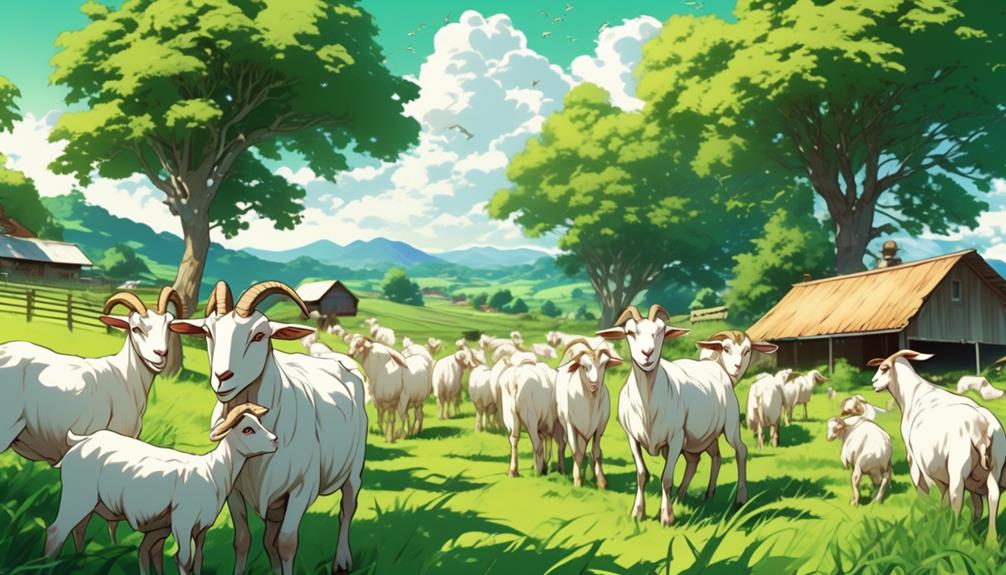
If you’re looking for a versatile goat breed that excels in both milk and meat production, consider the best dual-purpose goat breeds available. These breeds are ideal for those who want to maximize productivity on their homestead or farm.
One option is the Pygmy goat, which is a small dual-purpose breed that can provide both milk and meat. Nubian goats are also known for their dual-purpose capabilities, making them a popular choice among farmers.
Another versatile breed is the Nigerian Dwarf goat, which is smaller in size but still suitable for milk and meat production on a smaller scale. Alpine goats, on the other hand, are larger breeds that are valued for their milk and meat production. Lastly, Saanen goats are recognized as a dual-purpose breed, prized for their substantial milk production and meat potential.
When choosing the right goat breed for your farm or homestead, consider these dual-purpose options that can provide both milk and meat.
‘Did You Know? Goats have been bred for specific purposes throughout history, and today’s dual-purpose breeds are the result of centuries of selective breeding.’
Dairy Goat Breeds
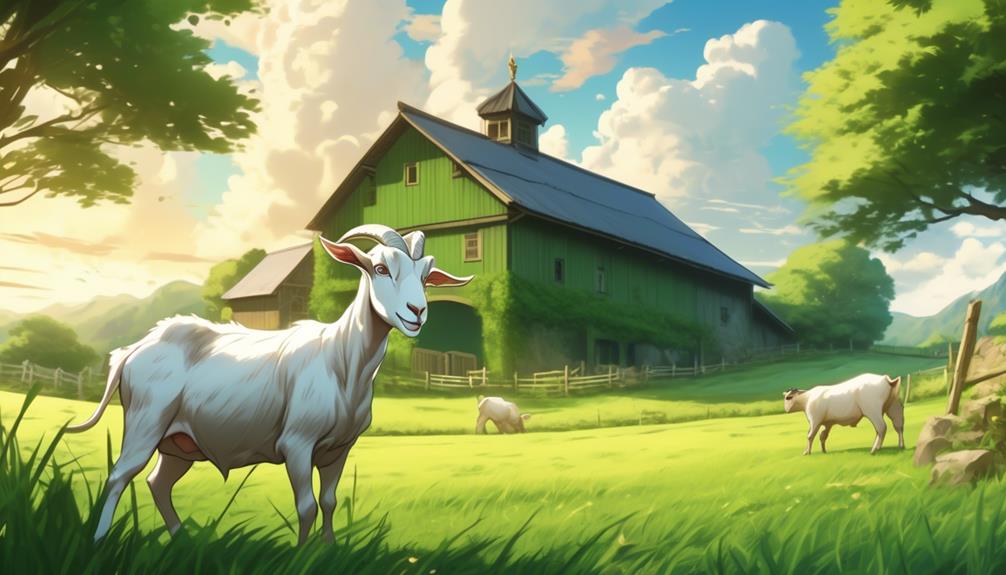
To choose the right dairy goat breed for your farm or homestead, consider the milk production capabilities and butterfat content of different breeds. Here are some dairy goat breeds to consider:
- Saanen goats: Known for their high milk production, Saanen goats are a popular choice for dairy farmers. They have a mild flavor and produce a large quantity of milk with a lower butterfat content.
- Alpine goats: Alpine goats are known for their hardiness and adaptability to different climates. They produce a good amount of milk with a medium butterfat content.
- Nubian goats: Nubian goats are known for their high butterfat content, making their milk rich and flavorful. While they may not produce as much milk as some other breeds, their milk is highly sought after for cheese making.
- Toggenburg goats: Toggenburg goats are known for their excellent milk production and high butterfat content. They are a popular choice for those looking to make butter and other dairy products.
When selecting a dairy goat breed, also consider factors such as the size of your farm or homestead, your level of experience in goat keeping, and your specific needs for milk production. By taking these factors into account, you can choose a dairy goat breed that will best meet your needs and provide you with a reliable source of milk for your family or business.
‘Did You Know? Goats have been domesticated for over 10,000 years and have played an important role in human civilization as a source of milk, meat, and fiber.’
Miniature Goat Breeds
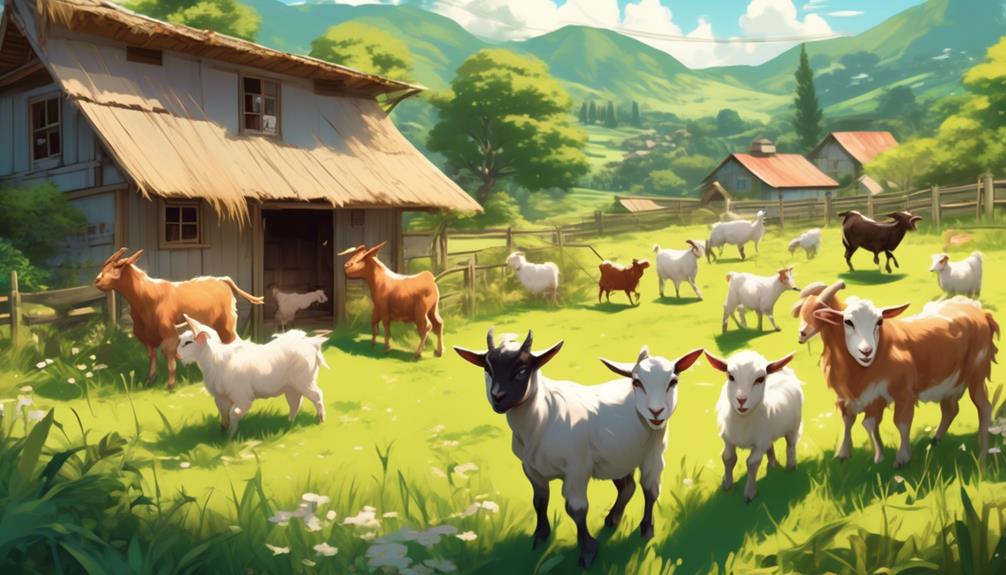
When considering the right goat breed for your farm or homestead, it’s important to also explore the world of miniature goat breeds that are suitable for smaller spaces and offer a range of benefits.
Miniature goat breeds are perfect for those with limited space, as they require less room than larger breeds. Despite their smaller size, these goats are still excellent milk producers, providing delicious and high-quality milk for your homestead.
Two popular miniature goat breeds known for their milk and friendly disposition are the Nigerian Dwarf and Pygmy goats. Not only do they produce milk, but they also make great companion animals due to their gentle and playful nature.
These small goats are more manageable in terms of feed, space, and maintenance, making them an ideal choice for those who want to enjoy the benefits of goat-keeping on a smaller scale.
Whether you’re looking for milk, meat, or a pet for your homestead, miniature goat breeds offer versatility and charm.
‘Did You Know? The Nigerian Dwarf goats are known for their high butterfat content in their milk, making it perfect for cheese and soap making!’
Best Goats for Clearing Brush
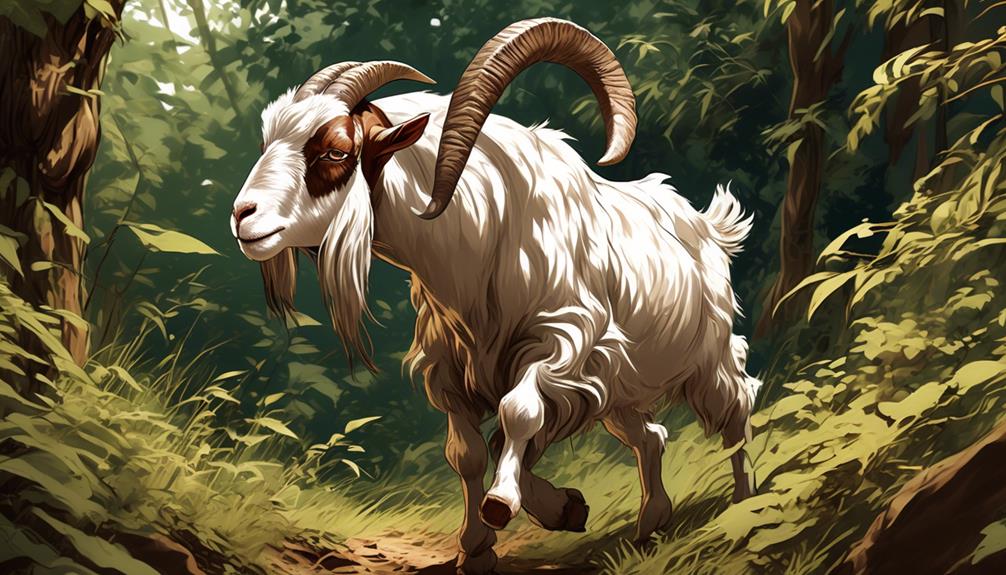
Boer, Kiko, Spanish, Savanna, and Brush Goats are the best goat breeds for clearing brush due to their efficiency, adaptability, and natural brush clearing abilities. These breeds have the innate ability to efficiently graze on brush and weeds, making them an ideal choice for land management on your homestead or farm.
Here’s why these goats are the top picks for clearing brush:
- Efficient Grazers: Boer, Kiko, Spanish, Savanna, and Brush Goats are specifically bred and suitable for brush clearing. They have a voracious appetite for brush and weeds, allowing them to clear large areas quickly and effectively.
- Adaptability: These goat breeds are resilient and adaptable, requiring low maintenance. They can thrive in various environments and climates, making them suitable for different regions.
- Dual Purpose: In addition to their brush clearing abilities, these breeds are also used for meat production. This makes them a practical choice for those who desire both brush clearing and a source of meat on their homestead or farm.
Using goats to clear brush and weeds is a sustainable and effective method of land management. These animals have natural brush clearing abilities and are highly efficient at grazing on vegetation that other livestock may not consume.
One of the main advantages of using goats for brush clearing is their adaptability. They can thrive in a variety of climates and terrains, including steep and rocky areas where other machinery or animals may struggle to access. Goats are also able to navigate through dense vegetation, making them effective at reaching areas that are difficult to access by humans or machinery.
The mentioned goat breeds – Boer, Kiko, Spanish, Savanna, and Brush Goats – are particularly well-suited for brush clearing. They possess the characteristics necessary for efficient brush grazing, such as large appetites, high browsing abilities, and hardiness. These breeds have been selectively bred for their ability to thrive on a diet of brush and weeds, allowing them to convert unwanted vegetation into valuable meat or milk.
When using goats for brush clearing, it is important to properly manage their grazing patterns. Rotational grazing is commonly employed, where goats are moved to different areas periodically to ensure they have access to fresh vegetation and prevent overgrazing. This method allows the goats to effectively clear the targeted areas while maintaining the overall health and productivity of the land.
In addition to their brush clearing abilities, goats also provide other benefits to the land. Their droppings act as a natural fertilizer, enriching the soil with nutrients. Goats can also help control the spread of invasive plant species by consuming their seeds, reducing the likelihood of further infestation.
However, it is essential to consider the specific needs and requirements of goats when planning to use them for brush clearing. Providing proper fencing to contain the goats and protect them from predators is crucial. Access to clean water, shelter, and adequate nutrition is also vital for their well-being and productivity.
So Which Goat?
Choosing the right goat breed for your homestead or farm is crucial for your satisfaction and success. Consider all of the factors previously mentioned, such as purpose, space, and temperament to ensure a good fit. Some popular options include:
- Boer and Kiko for meat production
- Saanen and Alpine for dairy
- Nigerian Dwarf for smaller homesteads
Don’t forget to factor in cost and climate adaptability. Remember, finding the perfect goat breed is like finding the missing piece to your farming puzzle. Take some time to think it over and you’ll find the right goat breed for you.
More Information…
You might also like to check out the video below. It contains some excellent advice about selecting the right goat breed for your needs and also useful tips on raising goats in general.
